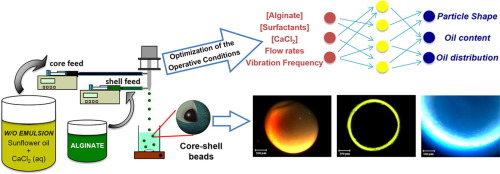Abstract
Numerous studies have been focused on hydrophobic compounds encapsulation as oils. In fact, oils can provide numerous health benefits as synergic ingredient combined with other hydrophobic active ingredients. However, stable microparticles for pharmaceutical purposes are difficult to achieve when commonly techniques are used. In this work, sunflower oil was encapsulated in calcium-alginate capsules by prilling technique in co-axial configuration. Core-shell beads were produced by inverse gelation directly at the nozzle using w/o emulsion containing aqueous calcium chloride solution in sunflower oil pumped through the inner nozzle while an aqueous alginate solution, coming out from the annular nozzle, produced the bead shell. To optimize process parameters artificial intelligence tools were proposed to optimize the numerous prilling process variables. Homogeneous and spherical microcapsules with narrow size distribution and a thin alginate shell were obtained when the parameters as w/o constituents and polymer concentrations, flow rates and frequency of vibration were optimized by two commercial software, FormRules® and INForm®, which implement neurofuzzy logic and Artificial Neural Networks together with genetic algorithms, respectively. This technique constitutes an innovative approach for hydrophobic compounds microencapsulation.
Conclusions
Sunflower oil microencapsulation in calcium-alginate capsules was carried out by the development of an innovative inverse gelation approach in which the ionotropic gelation was reached immediately out of a co-axial nozzle of a prilling encapsulator apparatus. By this method, core-shell microcapsules were obtained in a single step process after the setting of the process operating variables by means of the implementation of artificial intelligence tools based on ANNs, neurofuzzy logic and genetic algorithms. Particles were then obtained with desired size and morphology containing a single and homogeneous oily core. The optimized parameters by AI tools allowed to manufacturing of spherical core-shell beads (sphericity coefficient about 0.98) with diameter about 1.1 mm and a narrow size distribution containing the oily droplet wrapped by a thin and regular alginate layer (about 95 m). The use of AI tools allowed the optimization of prilling operating conditions through a reduced number of preliminary experiments permitting for the first time, the manufacturing of microcapsules by inverse gelation using this technology. The results demonstrated that proper interaction between Ca2+ into the W/O emulsion and alginate can be tailored to produce core-shell beads with different hardness loaded with oil or drugs dispersed into lipids useful in various kind of applications.
Recommended for you

